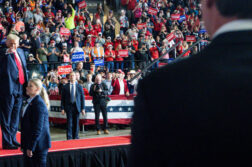If there was ever an idea more irrelevant to the pressing needs of Australia – the housing crisis, global warming, income inequality, public health, the child abuse epidemic, ending our participation in a foreign carnage – it must surely be The Republic. I capitalise the term deliberately, given the way its proponents solemnise it as a national priority.
An Australian republic would not house the homeless, relieve the pain of patients on hospital waiting lists, reduce our carbon emissions, save a child, tame obscene executive salaries or bring home our troops. At its best, it would (temporarily) raise the living standards of a superannuated politician, judge or general, as they are most likely to end up president under the unelected model preferred by the leading republicans. At its worst, it is would distract progressives from the real task of pursuing economic justice and ecological sustainability.
The Australian left, since the end of the Cold War, has been highly susceptible to fashionable culturally liberal causes, such as the Mardi Gras and "diversity" festivals. But such circuses do little, if anything, to alter the fundamental power relations in modern Australia. In the same vein, an Australian republic would be more about symbolism than genuine democracy.
Progressive republicans will argue that the two goals – economic equality and an Australian head of state – are not mutually exclusive. Strictly speaking, this is so. But consider recent history.
In 1992, soon after toppling Bob Hawke for the prime ministership, Paul Keating excited the left of his party, which was seemingly bereft of an alternative economic vision to laissez faire economics, with his republican fantasy. It was motivated partly by Keating’s crude anti-English nationalism, but it was also a sop to the Labor Left, a project to keep them occupied and out of the way while he continued to deregulate the economy, privatise public assets and export manufacturing jobs to the sweat shops of Asia. This was Keating famously "flicking the switch to vaudeville", just as the great composers John Kander and Fred Ebb had counseled in the lyrics to their musical, Chicago:
Give ’em the old razzle dazzle
Razzle Dazzle ’em.
Give ’em an act with lots of flash in it
And the reaction will be passionate.
Give ’em the old hocus pocus
Bead and feather ’em.
How can they see with sequins in their eyes?
It is hardly surprising then that the most enthusiastic booster of the cause, other than Keating, was a velvet-tongued merchant banker from the Eastern Suburbs – a former lieutenant to Kerry Packer, no less – named Malcolm Bligh Turnbull. The republican cause found its most passionate adherents not on the shop floors of the steelworks of the Hunter Valley or the Illawarra – the workers were smart enough to recognise a con when they saw it – but in the salons of the eastern suburbs of Sydney and Melbourne.
The great fraud of the republic was that it allowed corporate spivs to indulge their fantasy that they were somehow progressive and modern. Never mind that their attitudes to the rights of employees were medieval, or that their business practices were to slash and burn rather than build and invest. Their support for an Australian republic made them "forward thinking". They could hold their heads high in the boardrooms of South East Asia as they signed another deal for cheap labour. The republic was good for Australia’s business reputation in the new world.
Beyond the price of a corporate table at a fundraiser, an Australian republic cost Australia’s economic elites – the real elites – nothing. No new taxes, no economic sacrifice. That’s why, when you look at the results of the 1999 referendum, the republic found its strongest support in safe Liberal seats, especially what would become Turnbull’s electorate of Wentworth. In mortgage-belt electorates and in rural and regional Australia, where people still grow stuff and repair things, rather than simply shuffle, and sometimes swindle, other peoples’ money, they had no time for such elite flights of fancy.
A monarchy is, by definition, anti-democratic, but look around and you’ll find the most enduring social democracies, where the wealth gap is narrower and living standards are higher, are constitutional monarchies: Sweden, Norway, Denmark, the Netherlands, Spain. The most equitable society in the Americas remains Canada, with its national health system, civilised working condition and liveable cities. And yet it remains in the bosom of the British monarchy.
Australia’s democracy is not seriously threatened by its constitutional monarchy and even Gough Whitlam has acknowledged that in 1975, had Buckingham Palace been aware of John Kerr’s plans to sack the Labor government, it would have disapproved. Kerr, acting unilaterally, sacked Whitlam in the service of Australia’s bunyip aristocracy – of West Australian mining magnates, reactionary Queensland developers and every other vested interest – not in the service of a monarch who had lived amiably with genuine socialist governments, such as Harold Wilson’s Labor administration.
The essence of the progressive project has been breaking down great concentrations of economic power. An Australian republic remains a tenth-order, tick-the-box-yes-or-no priority. For working Australians, grappling with spiraling mortgages or rents, struggling to commute vast distances across increasingly unliveable suburban wastelands, waiting months to see a medical specialist in remote corners, fearful for their jobs in an uncertain international economy, a republic is little more than an elite preoccupation.
All the hand-wringing about "national identity" does little to correct the lop-sided power in contemporary Australia. Surely the left has bigger fish to fry.
Donate To New Matilda
New Matilda is a small, independent media outlet. We survive through reader contributions, and never losing a lawsuit. If you got something from this article, giving something back helps us to continue speaking truth to power. Every little bit counts.



